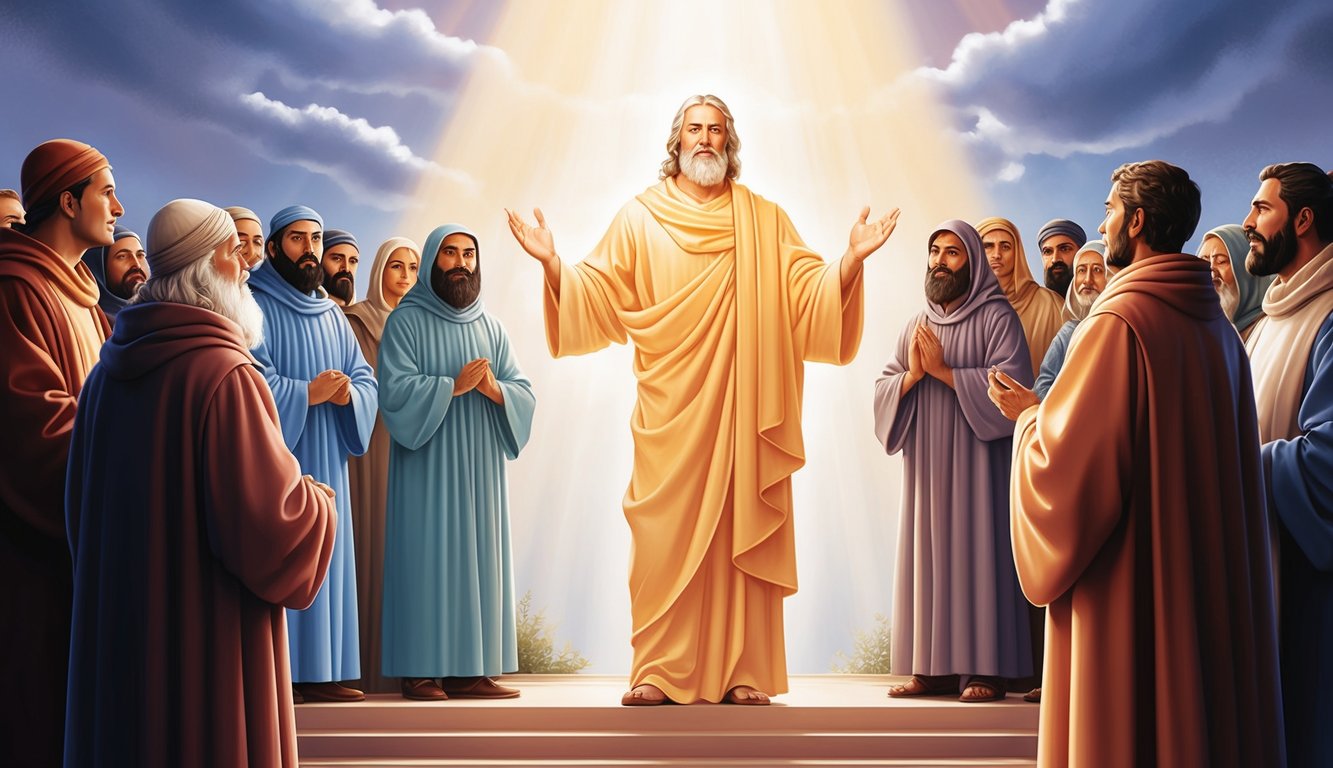Don’t Miss Out On This Unique Astrological Opportunity
Are you tired of spinning your wheels and getting nowhere? Simply put, you’re out of sync: you’re out of alignment with your astral configuration.
But: there’s a kind of map that can help you reclaim your alignment. Think of it as your own personal blueprint to success and happiness: a blueprint that will help you live your most amazing life.
Get started here.
The phrase “In the beginning was the Word” has intrigued and inspired countless readers looking to understand the mysteries of creation and divine purpose.
This opening line from the Gospel of John sets the stage for a profound exploration of the relationship between the Word, God, and the foundation of life itself. In many ways, it introduces the concept of Jesus as the living Word, connecting the divine with humanity in a powerful way.
These initial words not only echo the creation story found in Genesis but also offer a deeper insight into the divine nature of Jesus.
By identifying the “Word” with God, this text links the concepts of life and light with a divine presence, offering a foundation for spiritual teachings and beliefs.
Exploring this passage provides a glimpse into the relationship between God and creation.
Understanding this passage means looking into the pivotal role of John the Baptist and the first disciples in sharing these spiritual truths.
These early teachings continue to resonate, inviting you to explore the transformation that the Word brings to life.
By engaging with this text, you’ll see how it weaves together themes of light, life, and divinity, and why it remains a central piece of faith for many.
Its poetic structure and profound messages offer layers of meaning that resonate across generations. Quis lipsum suspendisse at the heart of its narrative underscores the deep connection between the divine and human experience.
Through its verses, readers find guidance, hope, and a timeless reflection on the nature of existence.
Key Takeaways
- The Word connects with God and creation.
- Jesus is seen as the living Word and light of men.
- John the Baptist and the disciples helped spread these teachings.
The Word and Its Connection to God
The Word is central to understanding the relationship between God and creation.
The role of the Word in Biblical teachings helps reveal the nature of Jesus Christ, highlighting His divine essence and role in the universe.
The Divinity of the Word
You find a profound statement about divinity in John 1:1.
It tells you that “the Word was God.” The term “Logos,” often translated as “Word,” refers to Jesus Christ.
In Christianity, Jesus is seen as the Son of God with divine attributes.
He was with God from the very beginning, existing eternally.
This connection emphasizes that Jesus is not just a creation but an eternal part of God Himself.
The concept underlines His divine nature, meaning Jesus shares in God’s essence.
So, when reflecting on Jesus, you should recognize His eternal and divine presence alongside God.
Creation through the Word
According to John 1:3, the Word is not just divine; it’s also the source of all creation.
When you look at the world, everything is made through Him.
Without Him, nothing has come into being.
This tells you that the Logos, or the Word, played a critical role in the creation of the universe.
Jesus, being the Word, is the Creator, through whom all things were made.
This makes you understand that every aspect of existence traces back to Him.
The connection between the Word and creation helps establish Jesus as central in Christianity, highlighting His power and influence over the natural world.
The Word Becoming Flesh
John 1:14 provides insight into how the Word became human.
You learn that the Word became flesh and lived among humanity.
This transformation is an essential part of Christian beliefs.
It signifies Jesus Christ taking on human form, known as the Incarnation.
He did this to live with and guide people.
This act helps deepen the connection between God and humanity.
The Word becoming flesh is an essential part of the narrative, highlighting Jesus’ willingness to bridge the divine and human realms.
Through this, you see Him not only as a divine being but as someone who shared in human experiences, offering understanding and guidance.
The Life and Light of Men
In “The Life and Light of Men,” you’ll find how life in Jesus brings light to humanity, and how this light stands strong against darkness.
The Essence of Life in Jesus
In John 1:4, the essence of life in Jesus is profound.
Life isn’t just about physical existence.
It is also spiritual and eternal.
Jesus is seen as the source of life, breathing spirit into human existence.
When you acknowledge Jesus, you find hope, purpose, and connection.
This life that he embodies is filled with grace, a gift from Jesus to humanity.
Through him, life flourishes, offering not just existence but a deep sense of meaning and vitality.
Through his unwavering love, he seeks to restore and uplift those who feel lost or disconnected. Luke 19:110 explained, this reflects Jesus’ mission to seek and save the lost, demonstrating his boundless compassion for humanity.
Embracing his grace allows individuals to experience true transformation and a renewed sense of purpose.
The Light Triumphing over Darkness
Jesus is the True Light.
This light symbolizes truth, understanding, and guidance in a world that can often feel dark or confusing.
John 1:5 speaks to how this light shines brightly, and darkness cannot overcome it.
When light enters darkness, it transforms it, showing you a clearer path to follow.
You can lean on this light for guidance and enlightenment.
It’s an enduring beacon that offers clarity, truth, and hope in all situations, helping you navigate even the most challenging times.
The true light of Jesus triumphs and continues to shine, offering you direction and wisdom.
The Ministry of John the Baptist

John the Baptist played a crucial role in preparing people for the arrival of Jesus.
He preached repentance and baptized many, emphasizing the importance of spiritual cleansing.
The two key moments in his ministry highlight his testimony about Jesus and his iconic act of baptizing Him in the Jordan River.
The Testimony of John
In the wilderness, John declared the coming of someone greater than himself.
As a prophet, he was a voice calling people to repent and prepare for the truth.
His message was clear and powerful: the Kingdom of Heaven was near.
People from all parts of Judea came to hear him, recognizing the witness of his words.
John didn’t seek personal glory.
Instead, he directed attention towards Jesus, emphasizing his role in the divine plan.
His testimony highlighted Jesus as the promised Savior, helping many understand the significance of His arrival.
Baptizing the Lamb of God
John baptized people in the Jordan River, symbolizing purification and repentance.
Among those he baptized was Jesus, whom he proclaimed as the Lamb of God.
This moment was profound.
It marked the beginning of Jesus’ public ministry and fulfilled ancient prophecies.
During the baptism, a voice from heaven affirmed Jesus as God’s beloved Son.
This event not only confirmed Jesus’ divine mission but also strengthened John’s role as a key figure in the biblical narrative.
You learn from John’s humility and commitment to God’s work, which sets an example of faith and dedication.
The First Disciples and Teachings

When Jesus began His ministry, He called His first followers, who played a key role in spreading His teachings.
They were introduced to important principles of faith and belief through their interactions with Jesus.
Calling the First Followers
When Jesus began gathering His disciples, some of the earliest were Andrew and Simon Peter.
Andrew met Jesus first and then brought his brother Simon Peter to Him.
Jesus gave Simon the name Peter, which means “rock.”
In Galilee, Jesus called Nathanael.
Initially skeptical, Nathanael questioned if anything good could come from Nazareth.
However, his encounter with Jesus, who revealed knowledge of Nathanael sitting under the fig tree, convinced him.
He hailed Jesus as the “Rabbi” and “King of Israel.”
These personal invitations to follow were marked by the promise of greater things to come, hinting at the profound journeys of faith ahead for these disciples.
The Teachings on Faith and Belief
Jesus focused heavily on faith and belief, challenging His disciples to look beyond the ordinary.
He taught that faith wasn’t just about seeing miracles but trusting in deeper truths about the Son of Man.
Through signs and discussions, the disciples learned to recognize Jesus as the Messiah.
One notable moment was Jesus’ first miracle at the wedding in Cana, an act that deepened their belief in Him.
The teachings encouraged the disciples to embrace their roles, empowering them to spread the word of God.
By instilling this deep sense of belief, Jesus prepared them to share His message far and wide.
Frequently Asked Questions

The phrase “In the beginning was the Word” explores deep theological concepts about the nature of God, Christ, and creation.
It links Jesus to the divine and emphasizes His role in the world’s creation.
What does ‘In the beginning was the Word’ signify in a theological context?
“In the beginning was the Word” establishes the pre-existence of Christ and connects Him with God’s creative power.
It indicates that Christ was present from the very start and played a fundamental role in creation.
How is ‘the Word’ explained within the framework of John 1:1?
In John 1:1, “the Word” refers to Jesus as both distinct from God and fully divine.
This text highlights the unity and distinct roles within the Trinity.
It emphasizes that Jesus, or the Word, shared an eternal relationship with God.
What is the significance of ‘the Word’ being with God in the beginning?
The presence of “the Word” with God signifies the intimate relationship within the Trinity from eternity past.
It underscores the idea of Jesus being integral to the Godhead and foundational in all things that were created.
In John 1, how is ‘the Word’ related to Jesus?
John 1 identifies Jesus as “the Word,” emphasizing His divine nature and role as God’s expression to the world.
It suggests that Jesus is God’s message and embodiment, through whom all things were made and who brings light to humanity.
How does the King James Version of the Bible articulate the concept of ‘the Word’ in Genesis?
In the King James Version, Genesis speaks of creation by God’s command.
This echoes the Gospel of John, where “the Word” is seen as God’s creative expression.
It reinforces the connection that Christ is the agent through whom all things were formed.
What interpretations are offered by biblical scholars for the phrase in reference to the divine nature?
Biblical scholars often view “the Word” as indicative of Christ’s function as the divine intermediary in creation.
It reflects His participation in the divine essence and His unique role in relating humanity to God.



